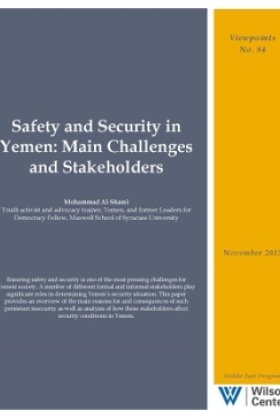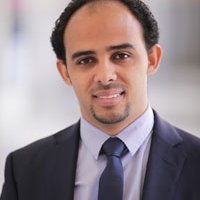Safety and Security in Yemen: Main Challenges and Stakeholders



Ensuring safety and security has been one of the most pressing challenges for Yemeni society. Various conflicts at the local and national levels, fueled by desire for power, revenge, and control over resources, are the main cause of these challenges. The corrupt nature of the government and the weakness of formal security providers—particularly the police force—have resulted in Yemenis’ declining confidence in the state to address their security and safety concerns. Informal actors like militias and different armed groups have used the acquisition of community support to gain power and challenge the government. This has not only made it increasingly complicated to achieve a healthy political system in Yemen, but it has also made it difficult for Yemeni citizens to live safely under the rule of law.
Mistrust is at the core of interaction among parties throughout various negotiations in Yemen. The outcomes of negotiations since the GCC initiative, the National Dialogue Conference, and the Peace and National Partnership Agreement have often been dominated by stronger national powers like the General People’s Congress (GPC), the Houthis, and Islah and influenced by other countries, especially Saudi Arabia and Iran. These actors have used the negotiations to gain the support of the media and the public, instead of working toward a solution that satisfies all parties. These powers persuaded and compelled local communities to support them by taking advantage of their needs for basic services such as water, electricity, fuel, gas, and security.
Apart from the government, there are many different stakeholders who impact the safety and security of Yemenis, including political parties, militias, some civil society organizations, tribes, and social figures. Despite the involvement of numerous parties, the concerns of many oppressed groups have not been fully addressed or resolved. Instead, stakeholders exploit the vulnerability of groups including women, youth, and marginalized communities to legitimize their control of the population, but the neglect truly involving the groups in finding a solution that meets their security needs.
While the Yemeni government possesses the tools and manpower to provide security to its citizens, it tends to prioritize the interests of individuals involved in the government sphere. For example, the government empowers informal security providers by guaranteeing high positions of authority to them and by supplying them with the monetary and military resources necessary to control areas under their own regulations. This augments the people’s perception of government corruption and opacity and reduces the population’s faith in the ability and willingness of the security forces to solve public safety issues.
The responsibilities of security providers under the Ministry of Interior that would legitimize their role on the ground have not been specifically identified. Rather, the most common practice is for formal security forces to arbitrarily define their own rules based on their leader’s interests. For instance, there have been multiple cases of the Central Security Forces conducting crime patrols without ever notifying local police forces. The lack of cooperation between these forces contributes to the overall ineffectiveness of the security system.
A number of inefficiencies hinder the ability of local police forces to provide adequate security to Yemeni citizens. Police stations rarely have sufficient manpower, causing frequent delays in response time to crimes. Often if police forces target a suspected criminal who has strong ties to powerful leaders in the political system, the suspect is released. One police officer said, “We have a famous drug dealer in the area, but whenever we have captured him, we have received calls from high ranking officials to release him; so we have given up chasing after him.” Due to the corrupt nature of the police force and its methods, the security concerns of many Yemeni citizens remain unaddressed.
When asked how the police should improve their efforts to ensure security, a nurse from Taiz expressed her frustration, “If you have your family, there is no need for the police. I cannot go to the police because there are no female officers and the police consistently shift the blame onto me and ruin my reputation.” These obstacles have led community members to distrust the formal security providers and depend on their own families to resolve their safety concerns.
The corrupt security system has also strained and divided the Yemeni military. This poses obstacles to cultivating a cohesive national army that can provide proper security. Because most security leaders have strong ties to decision makers, they are able to use these connections to increase their budgets or to get involved in other conflicts. If it serves their interests, these forces may also prolong conflicts by reducing efforts to mitigate crises or even by selling weapons to the opposition. Not only do these actions promote corruption and overall conflict, but they also produce individuals who are loyal to their leaders rather than to the country. Since 2011 many political parties have used loyal armed groups to engage in conflict, further complicating the political situation in Yemen.
Due to these aforementioned reasons, citizens rely more on informal security providers such as tribal and religious leaders, social figures, political parties or powers, local authorities, or neighborhood chiefs instead of formal security forces. In periods of conflict, this dependence on the community for security brings family ties to the forefront and causes the population to create internal alliances against the government and formal security providers. Informal security providers are then emboldened, creating a rift between the government and these informal forces as the government attempts to regain its control over the people.
In addition to local forces, there are also armed groups present throughout Yemen that impact the security of citizens. The actions of these armed forces range in their degree of radicalism, with some extreme organizations such as Al-Qaeda in the Arabian Peninsula (AQAP) and some more ideological powers such as the Houthis and the southern resistance groups. However, both groups have attempted to replace existing security forces. The Houthis and southern resistance groups emphasize how they have been oppressed and marginalized in order to gain strong community support from those who share their sentiments and ideology.
While the community may not accept the authority of armed groups, people in many areas are content with their presence so long as the groups provide basic security and services. For example, in Sa’ada, people used to complain about the restrictions the Houthis imposed on them that led to increasing difficulties in accessing health and education services. Locals have accepted the idea of the Houthis ruling the city but only if they are able to play a role in providing the community with essentials like fuel, securing the roads, and resolving issues related to thefts and land disputes. Circumstances are similar now in Aden. While the local community previously complained about some of the armed groups, residents still see the situation as better than before. This means not only from the time when the Houthis controlled parts of Aden, but even since the civil war in 1994 when the community felt oppressed by forces taking their commands from northern elites like the Central Security Forces. Moreover, now these southern communities believe they are closer to reaching self-determination for separation. It is most important to understand in these cases that these armed groups are powerful funders and can provide incomes for their supporters. Hence, it is not surprising to see in many cities throughout Yemen acceptance of these groups is growing.
Similarly, as the AQAP noticed the public’s mistrust of the government, the extremist group took advantage of the political vacuum in Hadhramaut governorate to establish its control. As long as there is no violence in their area, the people of that governorate generally appear to accept AQAP’s presence. An activist from Hadhramaut said, “We hate the AQAP but compared to what is occurring in Taiz or Sana’a, we are in much better shape. They do not interfere much in our social work and now we can provide safe shelters for displaced Yemenis.” The control exerted by the armed forces widens the gap between the governing and the governed, failing to create trust between the two and fulfill the security concerns of Yemeni citizens.
Hoping to solve the issue and connecting with those who share the same security concerns, marginalized groups such as women and youth have resorted to civil society. This is a positive step forward for civil society organizations to begin cooperating in order to voice their grievances and communicate with formal and informal security providers on improving security.
Several measures should be taken to improve safety and security measures in Yemen and to increase trust among the government, security forces, and the people. First, the roles of formal and informal security providers must be explicitly identified and should not be left open-ended for forces to arbitrarily craft and enforce. Second, a system must be created to reduce corruption among these governing forces. Third, it is the responsibility of civil society organizations to work with all security providers to establish a link between them and the local communities. These organizations must also work with communities to prioritize their safety and security concerns in a way that works toward mitigating overall conflict issues. Finally, media and awareness campaigns should be used to facilitate cooperation among the different stakeholders in enhancing security and safety in Yemen.
The opinions expressed herein are those of the author and do not reflect those of the Wilson Center.


The Wilson Center’s Middle East Program serves as a crucial resource for the policymaking community and beyond, providing analyses and research that helps inform US foreign policymaking, stimulates public debate, and expands knowledge about issues in the wider Middle East and North Africa (MENA) region. Read more


